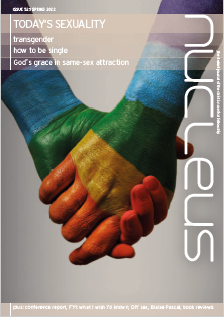During lockdowns and school closures I feel like I've watched pretty much the entire Disney+ back catalogue with my kids. I'm debating with my daughter whether Encanto is any good at all — she dislikes it and certainly won't talk about Bruno.
As we've watched, the question repeatedly arises in these films: Who am I? And the answer is consistent, too. We need to look inside ourselves. We need to throw off the expectations of others, of society, of religion and find and then embrace our true selves. Pixar — now in Disney's stable — often bring a more nuanced view as to the nature of identity. In Toy Story 4, Forky is created from discarded junk and made into a toy. During the film Forky thinks he's still junk and tries to jump back into the bin. He doesn't realise that his creator knows what he is made for and that because he is a toy, he finds his best life being enjoyed by children.
who am I?
We can't answer the question 'who am I?' without asking 'how do I find my identity?' Culture tells us to look inside and discover it (an 'internal identity narrative'). We have always seen a minority of people grapple with 'gender dysphoria', but until recently our culture has viewed sex and gender as one and the same thing (in accordance with biblical teaching and our scientific understanding). The internal identity narrative has changed that, coupled with a hyper-sexualised narrative (going back to Freud, Rousseau, Marcuse, and others) [1] that sees sexual and gender identity as the foundational aspect of our identity telling me 'who I am'. Other significant changes include a theological belief in no God and therefore no external authority; rigid media gender stereotyping; technology, including surgery to accomplish amazing things; the deification of limitless choice, and a mass media that promotes this ideology to impressionable young people. Given all this, perhaps it's no surprise that the Christian message on gender and sexual identity is so incomprehensible to many people.
a counter-story
And yet, ironically, the internal identity narrative doesn't work. Feelings and desires change. As a paediatrician I meet kids who have changed from one feeling to another over weeks and months. Acting on our feelings doesn't always deliver — prison is full of people who acted according to their feelings! Indeed, we all inhabit a story. The story our culture weaves together tells us who we are (creation), what went wrong (fall), and what the solution is (redemption). It is all around us — not just in the latest Disney film. We need a counter-story because arguing the facts and figures doesn't wash. That's despite the sexual revolution being an utter catastrophe when it comes to rates of mental health, [2] sexual intimacy, [3] loneliness, [4] pornography addiction, [5] childhood sexualisation, [6] and more. No, we need to grasp and be able to tell the biblical story as a good-news story, even though it may sound plain weird to many around us.
authority, knowledge, and trust
Before we consider this though, we must accept some assumptions before we open the Bible. We need to answer the following questions: whose authority are we willing to submit to? As Christians, when we accept that we are created beings we learn to supress our 'inner-Forky' feelings, and submit to our maker's instructions. We have to ask, 'who knows what is best for me?' 'Do I really know myself best?' 'Do I understand the impact of my decisions?' 'Who do I trust most on these issues — me or God?' We find out who we really are when we find our place in the story of God's salvation. There we find perfect authority, knowledge, and trustworthiness for a secure, stable, and unchanging answer to the question 'who am I?'. [7] So, let's unpack that story as we consider transgender issues.
creation
The Bible affirms from the very beginning that God made humanity as a male-female binary. Genesis starts with heaven and earth, light and darkness, land and sky, plants and trees, birds, and fish. We build with these complementary pairs to the pinnacle of creation on the sixth day — humanity, created in the image of the Trinity.
Then God said, 'Let us make mankind in our image, in our likeness, so that they may rule over the fish in the sea and the birds in the sky, over the livestock and all the wild animals, and over all the creatures that move along the ground.' So God created mankind in his own image, in the image of God he created them; male and female he created them. (Genesis 1:26-27)
Note that God is referred to first as 'us'; a plural complementarity is at the heart of the Godhead. God is by definition 'other-centred love'. Adam couldn't represent humanity alone or fulfil the command to multiply — he needed someone like him but clearly 'other'. Eve is created from Adam's side — not as an afterthought, but to highlight her importance as Adam's equal co-labourer. Later, Jesus affirms this binary:
'Haven't you read,' he replied, 'that at the beginning the Creator "made them male and female."' (Matthew 19:4)
In other words, there is no third sex. Male and female aren't the invention of patriarchal boors or Victorian prudes. This was God's idea. And these differences are displayed in our very bodies (I'll save you the anatomy lesson here). Our bodies speak to us and to who God has made us to be.
body and soul
Secondly, the Bible is equally clear that we are body and soul together. Our bodies are an essential part of our true selves and not second-class receptacles to be released from. Our biological sex determines our gender identity. A male is a man who can marry and become a father? and a female a woman who can marry and become a mother (note here I refer to 'potential' — not all men will do so, and it doesn't make you less of a man or woman if you remain single). Men and women are different at the deepest levels of their being; our chromosomes, brains, body shapes, and reproductive systems are different, and these bear witness to God's creative will for humanity (note I haven't mentioned personality types — the overlap is so significant and not a reliable way of categorising differences between male and female). We might even describe male and female as 'embodied otherness'.
pro-sex
Thirdly, the Bible is unashamedly pro-sex. A man is someone able to become one flesh — have sexual intercourse — with a woman, and a woman is someone who can become one flesh with a man. The distinction between men and women reflects the distinction between God and human beings. God is longing to be united with us — made possible through Christ. This can only be imaged through two distinct and different complementary 'others'. As Ephesians 5:32 states, the joining of man and woman in the sex act is 'about Christ and the church'. That may sound gross, but it is what the Bible teaches. The very act of an orgasm and the joining of male and female are a picture of Christ and the church and a foretaste of heaven. And so, if God has authority and if God knows what is best and can be trusted above all others, then we must heed the Bible's teaching
Fall
In Genesis 3 we see Adam and Eve doubting God's authority, knowledge, and trustworthiness. By taking the fruit, they exhibit the heart of human rebellion: 'I know better'. When they sinned, God's perfect creation was damaged and broken; suffering and pain and distress entered the world. All of us live with some degree of dissonance between what God says is true of us and what we feel to be true in everyday life. This isn't about it being hard for someone with gender dysphoria and easy for me. That they have a problem, and I don't. We can say, 'I know what you feel — know where you are coming from. There is that tension in my own life'.
The Bible is clear about distinguishing between affliction and sin. People who experience genuine gender dysphoria are not culpable and it isn't something people say they have chosen. It is a result of sin entering the world — indeed we see this at every level from physical to psychological to social to the very ground we tread on — but it isn't in itself a sin. That said, how we respond to life's challenges is important. The Bible contains a range of condemnations of behaviours that fall under the general banner of gender bending (eg crossdressing, [8] sexual effeminacy, [9] and gender ambiguity [10]). Deciding to let the feelings rule is sinful because it is deciding that your feelings will have authority over what you define as right and wrong (see Adam and Eve and that fruit).
Redemption
In his earthly life Jesus affirmed the binary nature of male and female; he was incarnated not as gender neutral but as a circumcised Jewish male. And yet he lived his entire life in a way that challenged stereotypes as to what a male and female should look like; he never had sex, and he never got married (which would have been the expected thing for a Jewish rabbi to do).
As Saviour, Jesus came to enter into the profound suffering of so many, and then to walk through it and out the other side. He came to deal with sin, to disarm it and do away with it. Redemption isn't found by measuring how well a person's gender identity aligns with their biological sex. Instead, redemption is being drawn to the person and work of Jesus Christ and to the power of the Spirit to transform us into his image. Jesus could often be found walking with the marginalised, the hurting, the derided and the untouchables. The Bible is good news to those who struggle with gender identity.
And yet most gender dysphoric adults don't see the healing they may desire. Indeed, the Bible doesn't promise total freedom in this life. [11] We can, however, point to our certain hope that one day Jesus is returning, and he will apply in full the victory he has won. Every bit of pain and suffering will end. God himself will wipe away our tears. [12] On that day those dissonances will be gone.
compassion
These reflections become very personal when you have sat with someone who has attempted suicide because of their dysphoria. As Jesus did, we are to have tremendous care and compassion for people. We must listen and understand before we can respond well, walking alongside people, perhaps groaning inwardly with them [13] and offering the comfort that we too have experienced [14] as part of a community of God — be it church or CMF. And whilst the best way to honour God's truth is to love people, the best way to love people over time is to bring God's life-giving truth. [15] Not explaining God's story and plan for sex and gender would mean omitting a key act of love.
summary
As we live alongside non-Christians, we can explain that we approach the Bible believing that our creator speaks to us and knows what is good for us. God has complete authority, perfect knowledge, and is utterly trustworthy. We have a secure foundation for our identity; rather than discovering it, we receive our identity from God even when we don't feel it. And yet we recognise the hurt people feel; we lead with compassion, and we point them to Jesus who walks alongside the hurting.
This is a wild story for many in our culture, but it's one we can confidently grasp and live out before a hurting world. That's the hope of the gospel. Now let's live it in all its glory for the sake of Christ.
































